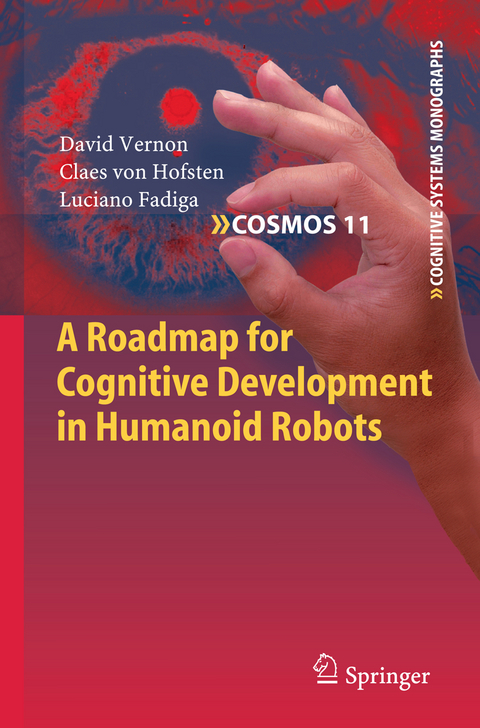
A Roadmap for Cognitive Development in Humanoid Robots
Seiten
2014
|
2011
Springer Berlin (Verlag)
978-3-642-42308-6 (ISBN)
Springer Berlin (Verlag)
978-3-642-42308-6 (ISBN)
This book addresses the central role played by development in cognition. The focus is on applying our knowledge of development in natural cognitive systems, specifically human infants, to the problem of creating artificial cognitive systems in the guise of humanoid robots. This results in roadmap comprising a set of forty-three guidelines for the design of a cognitive architecture and its deployment in a humanoid robot.
This book addresses the central role played by development in cognition. The focus is on applying our knowledge of development in natural cognitive systems, specifically human infants, to the problem of creating artificial cognitive systems in the guise of humanoid robots. The approach is founded on the three-fold premise that (a) cognition is the process by which an autonomous self-governing agent acts effectively in the world in which it is embedded, (b) the dual purpose of cognition is to increase the agent's repertoire of effective actions and its power to anticipate the need for future actions and their outcomes, and (c) development plays an essential role in the realization of these cognitive capabilities. Our goal in this book is to identify the key design principles for cognitive development. We do this by bringing together insights from four areas: enactive cognitive science, developmental psychology, neurophysiology, and computational modelling. This results in roadmap comprising a set of forty-three guidelines for the design of a cognitive architecture and its deployment in a humanoid robot. The book includes a case study based on the iCub, an open-systems humanoid robot which has been designed specifically as a common platform for research on embodied cognitive systems .
This book addresses the central role played by development in cognition. The focus is on applying our knowledge of development in natural cognitive systems, specifically human infants, to the problem of creating artificial cognitive systems in the guise of humanoid robots. The approach is founded on the three-fold premise that (a) cognition is the process by which an autonomous self-governing agent acts effectively in the world in which it is embedded, (b) the dual purpose of cognition is to increase the agent's repertoire of effective actions and its power to anticipate the need for future actions and their outcomes, and (c) development plays an essential role in the realization of these cognitive capabilities. Our goal in this book is to identify the key design principles for cognitive development. We do this by bringing together insights from four areas: enactive cognitive science, developmental psychology, neurophysiology, and computational modelling. This results in roadmap comprising a set of forty-three guidelines for the design of a cognitive architecture and its deployment in a humanoid robot. The book includes a case study based on the iCub, an open-systems humanoid robot which has been designed specifically as a common platform for research on embodied cognitive systems .
A Conceptual Framework for Developmental Cognitive Systems.- Pre-natal Development and Core Abilities.- The Development of Cognitive Capabilities in Infants.- What Neurophysiology Teaches Us About Perception and Action.- Computational Models of Cognition.- A Research Roadmap..- The iCub Cognitive Architecture.- Conclusion.
From the book reviews:
"This is a book concerning the development of iCUB humanoid robots involving motor, sensorimotor, and cognitive architectures. This is a necessary monograph on the subject and I highly recommend it for anyone interested in robots. ... This is a provocative and excellent book on robotics." (Joseph J. Grenier, Amazon.com, August, 2014)
| Erscheint lt. Verlag | 14.10.2014 |
|---|---|
| Reihe/Serie | Cognitive Systems Monographs |
| Zusatzinfo | XIV, 229 p. |
| Verlagsort | Berlin |
| Sprache | englisch |
| Maße | 155 x 235 mm |
| Gewicht | 379 g |
| Themenwelt | Geisteswissenschaften ► Psychologie ► Verhaltenstherapie |
| Informatik ► Theorie / Studium ► Künstliche Intelligenz / Robotik | |
| Medizin / Pharmazie ► Medizinische Fachgebiete ► Neurologie | |
| Technik ► Elektrotechnik / Energietechnik | |
| Technik ► Maschinenbau | |
| Schlagworte | Cognitive architectures • Cognitive Robotics • Developmental Psychology • humanoid robots • iCub • Neurophysiology |
| ISBN-10 | 3-642-42308-6 / 3642423086 |
| ISBN-13 | 978-3-642-42308-6 / 9783642423086 |
| Zustand | Neuware |
| Haben Sie eine Frage zum Produkt? |
Mehr entdecken
aus dem Bereich
aus dem Bereich
was sie kann & was uns erwartet
Buch | Softcover (2023)
C.H.Beck (Verlag)
18,00 €
von absurd bis tödlich: Die Tücken der künstlichen Intelligenz
Buch | Softcover (2023)
Heyne (Verlag)
20,00 €


